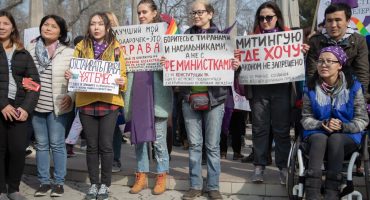In early March, the authorities predicted three thousand coronavirus infected patients in Kazakhstan. Today, there are over 50 thousand infected in the country already. There is a shortage of hospital beds in Kazakh hospitals. Patients are placed in the corridors. Not everyone is admitted, only those under 60.
Follow us on LinkedIn
The number of COVID-19 infected people in Kazakhstan rose sharply a month after the quarantine was eased and the emergency lifted. The number of patients increased 9 times, and the country re-introduced restrictions.
Zabykhan Kenzhetaeva is 92. She got infected with coronavirus, but was never able to be admitted to a hospital. When the medicines were available, she received the treatment at home, but for several days now, her relatives cannot find the necessary medicines in pharmacies. The pensioner complains that there is neither a professional nor a financial assistance from the state.
“We do not ask for a place in the hospital, we do not ask doctors to come to our homes, we just want to buy medicines that will save our lives. Who wants to die? No one. I have money, but we looked for medicines all over Kazakhstan and could not find them. I had to order the delivery from Russia. Fortunately, my granddaughter contacted her friends there, otherwise I would be dead already,” complains Kenzhetaeva.
Sayasat Nurbek has 30% lung damage. He says that he was admitted to the hospital by “pulling the strings”. His wife got infected first, and his symptoms appeared later. At first, he received the treatment for tonsillitis: he gargled his throat and took medicines.
“I was tested by the computer tomography only a week later – by using my connections. I could not get PCR-tested, even with my connection. The smear test was already taken here in the hospital. The ambulance hospitalized me right away; for some reason, my wife remained at home. I almost died, I was suffocating for five nights, I was in a critical condition,” Nurbek says.
As it turned out, the healthcare system in Kazakhstan was not prepared for the extraordinary situation. As healthcare workers write on social networks, doctors do not have enough special protective equipment – masks with filters and protective suits. Medical institutions do not always comply with safety requirements when working with the virus, which is why doctors are collectively quitting the jobs.
Kazakhstan allocated about $350 million to counter the coronavirus. In early March, the authorities assured that the country was prepared for the pandemic and that there would be enough pharmaceuticals until the end of the year. Now, all pharmacies in the country are unprecedentedly crowded.
“People are self-treating and buying antiviral drugs. Nobody controls these drugs’ price. “Grippferon”, which even during quarantine cost 1100-1500 tenge ($2.7-3.7), now is sold for 3250 tenge ($7.9). Why do our people try to make profit from any situation? Even at a time like this. The authorities do not even try controlling the rise in medicines’ prices,” says Natalya Raim, Almaty resident.
Members of Parliament are also dissatisfied with the government’s work.
“I and my wife are in the infectious diseases hospital. There are no medications. In Kazakhstan, there are no effective drugs that can help. Neighboring Russia has registered a drug against coronavirus; Turkey has also released its own drug. We cannot produce the drug, and we even cannot buy it from these countries, although they are cooperating with us. I cannot understand why we have such specialists in our Ministry who cannot react quickly?” asks the Mazhilis deputy Omarkhan Oksikbaev.
The situation is no better in the regions of the country. According to The New York Times, in early July, Kazakhstan became the world leader in pace of the coronavirus spread over the past two weeks. The President Kassym-Jomart Tokayev reprimanded the akims and the Deputy Prime Minister and considered the complaints of Kazakhstan residents about the pharmaceuticals prices to be fair.
“In Zhanaarka, my home village, five people die every day. Only 20 thousand live there. People do not attend funerals anymore: everyone wants to live. Where are our “smart and super effective” akims? What are they doing? Why do we pay taxes? If I were the President, I would not just reprimand, but deprive them of the right to hold a position in the civil service. We left people alone with COVID-19,” says TV host Dinara Satzhan.
The Fight Against Resellers
On July 5, Deputy Prime Minister Yeraly Tugzhanov spoke about the measures the government took to saturate the market with the medicines promptly. He announced the detention of medicine resellers in Shymkent. According to him, the shortage of medicines is caused by unfair competition and increased demand from the population.
“The persons detained for the purchase and resale of medicines will be punished in accordance with the current legislation. In May, 50 thousand packages of paracetamol were sold during the whole month in Almaty; now it is 100 thousand per day. Earlier, 100 thousand thermometers were sold per year; the same amount was sold in one week,” Tugzhanov said.
Currently, the Ministry of Internal Affairs conducts raids in all regions. According to the press service, the persons who organized the purchase of medicines in large volumes were identified already. Thus, they created an artificial shortage of these medicines, and then resold them at prices several times higher than their real value.
Multiple cases of medicines resale were revealed throughout the country. Opportunistic citizens sold medicines literally from under the counter without issuing the fiscal receipts. The buyers had no choice but to buy medicines at an unreasonably high price.
Such cases were revealed in Almaty, Akmola, Aktobe, Atyrau, East Kazakhstan, Zhambyl and West Kazakhstan regions. In total, during the first day of raids, 21 people were detained, and more than 3,500 packages of medicines were seized.

Screenshot from the operational footage from the press service of the Ministry of Internal Affairs of Kazakhstan
According to political expert Dosim Satpayev, the country’s authorities developed a protocol for the treatment of pneumonia, an outbreak of which is recorded now, but many people cannot buy the prescribed medicines. Either they are not in the pharmacies, or people cannot afford them, since the treatment is quite expensive.
“The state should stop cutting down the expenses for its citizens and promising things. After the purchase of the necessary medicines, which the authorities themselves have included to the treatment protocol, they should start distributing them free of charge, first to those who already called an ambulance and who was officially diagnosed and offered to receive the treatment at home,” Satpayev notes.
According to him, the purchase of medicines should be transparent and indicate suppliers, prices and quantities.
In early July, the Ministry of Health claimed that the anti-febrile medicines were already arriving at pharmacies.
“Until July 15, medicines will be purchased for another 28 thousand patients. Taking into account the additional purchase, the medicines will reach up to 58 864 patients,” the Ministry noted.
It was reported that paracetamol, Tamiflu and Ingavirin drugs will soon appear in Kazakh pharmacies, but will be sold in limited quantities to one person.
Meanwhile, Kazakhstan received humanitarian aid from Georgia and China, and the country’s Prime Minister asked for assistance from his Russian counterpart. Russia sent specialists and medicines for treatment. On July 2, the website of the Russian Direct Investment Fund reported that the anti-coronavirus drug “Avifavir” would soon arrive in Kazakhstan. It remains unknown whether this assistance will reach ordinary Kazakh people.
This article was prepared as part of the Giving Voice, Driving Change – from the Borderland to the Steppes Project.
If you have found a spelling error, please, notify us by selecting that text and pressing Ctrl+Enter.









